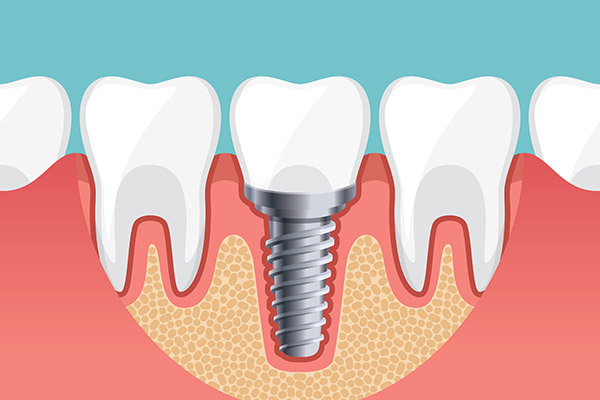 Patients missing one or more teeth may benefit from implant dentistry, which offers long-term replacement options. Continue reading to learn about replacing a single lost tooth with an implant. Implants are used to hold single crowns, bridges, or a whole set of teeth in place. Their application as fixed restorations, whether for single or multiple teeth, is one of the many reasons why implants are becoming more popular.
Patients missing one or more teeth may benefit from implant dentistry, which offers long-term replacement options. Continue reading to learn about replacing a single lost tooth with an implant. Implants are used to hold single crowns, bridges, or a whole set of teeth in place. Their application as fixed restorations, whether for single or multiple teeth, is one of the many reasons why implants are becoming more popular.
Implant dentistry: How to replace a single missing tooth with an implant
Dental implants are tooth root replacements. A tooth is made up of two parts: a crown and a root. A dental crown is the visible area of the tooth that is supported by the root section. The root is hidden under the gum tissue and surrounded by bone. Implants are surgically inserted into the bone to secure a prosthetic crown. Implant dentistry uses cutting-edge technology to create replacement teeth that appear, feel, and function like natural teeth. When natural teeth are lost, the jawbone deteriorates. Dental implants help to prevent this.
A dental implant may be an option for many individuals who have lost a tooth. Patients who smoke, drink heavily or use certain prescription medicines need to talk to a dentist about their choices. The ideal candidate will have excellent dental health, including strong gum tissue and jawbone structure.
How single tooth implants work
The implant is inserted into the jawbone during the dental implant placement procedure. The implant and the bone will fuse over two to six months to provide stable support for the prosthetic tooth. A temporary tooth replacement may be placed over the implant site during this period.
In most cases, a second surgical operation is required to expose the implant and secure an abutment extension. This temporary healing cap completes the framework for the placement of the new tooth. This second step is optional in certain implant systems. The extension component is already attached to the implant in these systems. The dentist will determine the best approach to use. Finally, the dentist will have a crown fabricated for the patient and attach it to a tiny metal post.
Dental implants are usually so natural-looking and feeling that they are hard to tell apart. Each person's situation is unique, and some of these stages may be combined when required. A dentist will help the patient develop the optimal treatment plan based on their specific requirements.
A single tooth implant process may take many months to complete. Bone grafting will be done first if the dentist determines that the patient's jawbone is not strong enough to support the implant. Grafting is the process of taking bone from somewhere else (or utilizing synthetic material) and adding it into the jaw to strengthen it. In some instances, the jaw must recover before the implant can be placed.
The bottom line
A dental implant post may last a lifetime with proper oral health habits. Compared to alternative tooth-replacement choices, implant dentistry offers more long-lasting and sturdier options. Contact our dental office today to schedule an appointment and explore your tooth-replacement options.
Request an appointment or call Gledhill Dental at 509-800-8410 for an appointment in our Kennewick office.
Related Posts
Having a solid handle on good oral hygiene basics will help preserve the integrity of your teeth and mouth health for a long time to come. Steering clear of cavities, receding gums, or decay ensures that your smile is bright and beautiful for as long as possible. If you think you already have an excellent…
Having a firm understanding of oral hygiene basics can prevent tooth decay, gum disease, and general oral discomfort. Human beings go through life developing a range of habits that impact oral health, some of which are good and some of which are bad. Avoiding these damaging behaviors promotes strong teeth and gums that can last…
Brushing and flossing your teeth daily are oral hygiene basics, but what about using mouthwash? Is it an essential part of keeping your teeth healthy.Except for fluoride rinses, mouthwashes are generally not part of the daily oral care routine recommended by dentists, but that does not mean it has no value. Using mouthwash correctly can…


